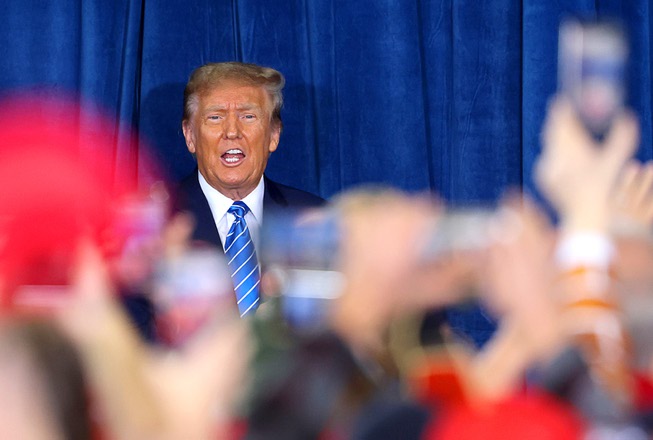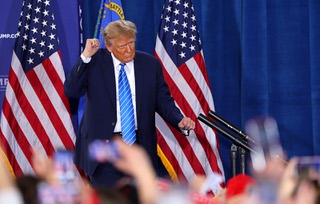
Former president and Republican presidential candidate Donald Trump arrives to speak at a Commit to Caucus rally at the Big League Dreams sports park Saturday, Jan. 27, 2024.
Sunday, Jan. 28, 2024 | 2 a.m.
Former President Donald Trump took to social media last week minutes after being declared the winner of the Republican presidential primary in New Hampshire.
In an inaccurate post, Trump also claimed he had won in Nevada, the next state in the GOP’s presidential nominating calendar.
Twenty-five minutes after media outlets called the New Hampshire race for the former president, Trump posted on his Truth Social an apparent dig at the only remaining primary opponent, former United Nations Ambassador Nikki Haley. The post, in all caps, proclaimed: “SHE JUST LOST NEVADA, WHICH IS UP NEXT!” And later that night he doubled down with a post saying, “WE JUST WON IN NEVADA!”
But Nevada isn’t holding its presidential nominating contests for another two weeks. Even then, Trump and Haley won’t be facing off, because Haley is on the ballot for the Feb. 6 presidential preference primary managed by the Nevada Secretary of State, and Trump is participating in the Nevada Republican Party’s “First in the West” caucuses Feb. 8.
The state GOP’s rules, endorsed by party leaders loyal to Trump, prohibit candidates from taking part in both the primary and caucus, meaning you won’t find Trump on the GOP primary ballot or Haley in the caucuses. Early voting for the primary started Saturday.
State GOP leaders further decided that only the caucuses’ results would be used to determine Nevada’s delegates to the Republican National Convention, where the party’s presidential nominee will officially be selected.
Trump’s rhetoric last week could be perceived by some as a way to energize his political base, but loudly prognosticating an election that has yet to occur can also have a chilling effect on voters, said David Damore, a political science professor at UNLV and executive director of Brookings Mountain West.
“The whole primary/caucus is shaping up to be quite strange and quite confusing,” Damore told the Sun in an email. “My sense is the more likely outcome is low participation for both the GOP primary and caucuses, which would undermine the party-building opportunities that can be reaped by caucuses and being an early (voting) state.”
And with nine months remaining before November’s general election, Nevada’s top election official is cognizant of the possible disenchantment with the options Republican voters have before them this election cycle. At a news conference earlier this month to highlight election security measures the state is taking for the statewide elections this year, Secretary of State Cisco Aguilar, a Democrat, was asked what his message is to political leaders or candidates who are pushing election misinformation.
“Run on your values,” said Aguilar, a first-term Democrat who ran on expanding voter access. “Run on what strengths you have as a candidate. You don’t need to focus on bad information or false information. Let’s really run on the values that we are as individuals, run on the values of our democracy and let’s stand tall about what strengths we bring to the table.”
But, if it were up to Trump and Republican Party leadership, the nominating process would be over before Nevadans have a chance to have their voices heard in the primary or caucuses.
On Thursday, a leaked draft memo from the Republican National Committee floated the possibility of naming Trump the “presumptive 2024 nominee” before he formally clinches the required number of delegates to earn the nomination by more traditional means.
The resolution was ultimately rescinded after Trump posted again to Truth Social he’d rather the party not go forward with the plan — opting to take a wait-and-see approach rather than jumping to the foregone conclusion that he will be the Republican nominee.
The resolution had been expected to be discussed at the RNC’s winter meeting in Las Vegas next week, even though only two states have voted and the former president had nowhere near the requisite number of delegates to secure the nomination.
“While I greatly appreciate the Republican National Committee (RNC) wanting to make me their PRESUMPTIVE NOMINEE, and while they have far more votes than necessary to do it, I feel, for the sake of PARTY UNITY, that they should NOT go forward with this plan,” Trump posted.
RNC Chair Ronna McDaniel had earlier signaled her support for the resolution. On Tuesday, after Haley finished second to Trump in New Hampshire, McDaniel said that while she felt the former ambassador had “run a great campaign,” Republicans “need to unite around our eventual nominee, which is going to be Donald Trump.”
Haley’s camp said Thursday that it wasn’t up to the RNC to decide who the GOP nominee would be.
“Who cares what the RNC says? We’ll let millions of Republican voters across the country decide who should be our party’s nominee, not a bunch of Washington insiders,” said campaign spokesperson Olivia Perez-Cubas.
Ultimately, Trump decided that he “should do it the ‘Old Fashioned’ way, and finish the process off AT THE BALLOT BOX.”
Trump is likely correct: He eventually will be awarded all of Nevada’s 26 GOP delegates because he is running virtually unopposed in the caucuses. Florida Gov. Ron DeSantis suspended his campaign Sunday, leaving political newcomer and businessman Ryan Binkley as Trump’s only opponent in the Nevada caucuses.
Like Trump in the state GOP caucuses, Haley is running basically unopposed in the Nevada GOP primary, but a scenario exists where she would not be the top vote getter.
Nevada Republican voters can cast their primary ballot for “None of these candidates,” and, in essence, show support for Trump. Or instead of Haley, they could vote for former Vice President Mike Pence or U.S. Sen. Tim Scott, both of whom suspended their campaign after filing to be in the primary.
Gov. Joe Lombardo, a Republican, is doing just that. He said last week he’d be caucusing for Trump and voting for “None of these candidates” in the primary. Republican Lt. Gov. Stavros Anthony also announced that is how he’d be voting.
A Jan. 9 Emerson College poll found turnout is expected to be higher in the primary than in the caucuses.
“If ‘None of these candidates’ wins in the primary, former President Trump will very likely say that he won the primary election as well,” said Sondra Cosgrove, a history professor at the College of Southern Nevada.
Cosgrove agreed with Damore’s assessment that turnout might be low in both contests, especially because Nevada’s presidential preference primararies are “closed” meaning only registered Democrats can vote for Democrats and only registered Republicans can vote for Republicans. But Nevada allows voters to update existing voter registration on Election Day, meaning anyone can switch parties to vote in a specific primary. (Rules for the Nevada caucuses are different and same-day voter registration updating is not allowed.)
Polls repeatedly show most voters do not want to see a 2020 rematch between Trump and Democratic President Joe Biden, despite all signs indicating that to be the case, Cosgrove said.
“Between Nikki Haley’s efforts to turn out independents to at least show support in Nevada, to the caucus appearing to favor former President Trump, to Joe Biden being the only viable candidate on the Democratic primary ballot, many people are saying to me, ‘Why even vote?’” Cosgrove said.
Aguilar had a message for constituents balking at the prospect of a Trump-Biden rematch: Vote, in February and November.
“This year, all eyes will be on Nevada,” Aguilar said. “Voters in Nevada will determine who becomes the next president of the United States.”
The Associated Press contributed to this report.

